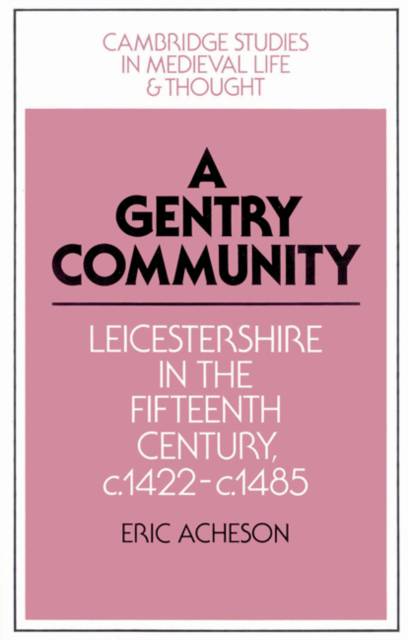
- Afhalen na 1 uur in een winkel met voorraad
- Gratis thuislevering in België vanaf € 30
- Ruim aanbod met 7 miljoen producten
- Afhalen na 1 uur in een winkel met voorraad
- Gratis thuislevering in België vanaf € 30
- Ruim aanbod met 7 miljoen producten
Zoeken
A Gentry Community
Leicestershire in the Fifteenth Century, C.1422 C.1485
Eric Acheson, Acheson Eric
€ 96,95
+ 193 punten
Uitvoering
Omschrijving
This book examines the fifteenth-century gentry of Leicestershire under five broad headings: as landholders, as members of a social community based on the county, as participants in and leaders of the government of the shire, as members of the wider family unit and, finally, as individuals. Economically assertive, they were also socially cohesive, this cohesion being provided by the shire community. The shire also provided the most important political unit, controlled by an oligarchy of superior gentry families who were relatively independent of outside interference. The basic social unit was the nuclear family, but external influences, provided by concern for the wider kin, the lineage or economic and political advancement, were not major determinants of family strategy. Individualism among the gentry was already established by the fifteenth century, revealing its personnel as a self-assured and confident stratum in late medieval English society.
Specificaties
Betrokkenen
- Auteur(s):
- Uitgeverij:
Inhoud
- Aantal bladzijden:
- 312
- Taal:
- Engels
- Reeks:
- Reeksnummer:
- nr. 19
Eigenschappen
- Productcode (EAN):
- 9780521524988
- Verschijningsdatum:
- 30/10/2003
- Uitvoering:
- Paperback
- Formaat:
- Trade paperback (VS)
- Afmetingen:
- 140 mm x 216 mm
- Gewicht:
- 399 g

Alleen bij Standaard Boekhandel
+ 193 punten op je klantenkaart van Standaard Boekhandel
Beoordelingen
We publiceren alleen reviews die voldoen aan de voorwaarden voor reviews. Bekijk onze voorwaarden voor reviews.











